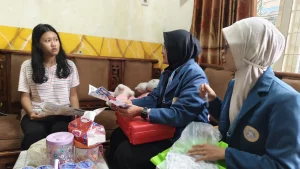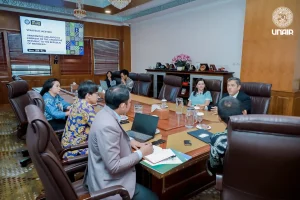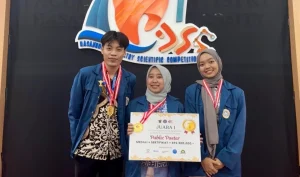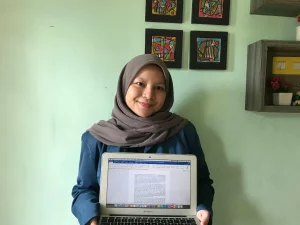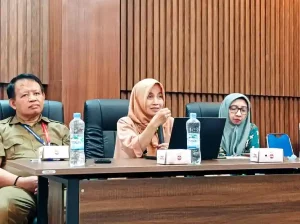UNAIR NEWS – Kalijudan in Surabaya City, is an area with large pond areas, but until now it has not been well utilized in conducting fish cultivation. Traditional pond processing costs a lot for its operational maintenance and it is incompatible with the results. There are also a lot of human resources, especially housewives who can be empowered.
From that problems, five students of the Universitas Airlangga, Ulfa Ulfiani (team leader), Rizka Ayu Marheni Putri, Iqyu Widya Kandi, Umi Hafidloh, and Abdul Muntholib, offered a cultivation technology as well as gardening called “AKANGTAPE” means milkfish aquaculture and their utilization.
The technology offered was a cultivation of milkfish in fiber ponds with hydroponic plants on top, in this case the spinach. During cultivation both fish and spinach can grow well and can be harvested simultaneously. The cultivation process does not use the soil as a growing medium, but utilizes the waste of milkfish.
Described by Ulfa Ulfiani, head of the PKMM team, this innovation was chosen because fish is a source of food with high quality of protein. It is composed of amino acids with the most complete composition the body needs for cell growth. In addition, fish protein is easily digested and absorbed by the body, rich in Omega-3, full of vitamins and minerals such as vitamins A, D, B6 and B12. One of the nutrients contained in fish that plays an important role to increase intelligence is DHA.
The Unair PKMM team wishes for the results of this service are, first, to send a message to the community about the knowledge and potential of fisheries in Indonesia. Second, to help the surrounding community to improve the economy through cultivation, farming vegetables, and processing various foods made from milkfish. The third goal, to introduce fish farming techniques and how to farm in a scope called aquaponic. Then the establishment of entrepreneurship cadre of PKK Kalijudan Posyandu.
“The next is for the implementation of the program, AKANGTAPE Training in Posyandu PKK Kalijudan is held on a regular basis, and this activity becomes the pioneer program for the surrounding community,” said Ulfa Ulfiani.

Besides helping the government to increase the level of fish consumption in the community, as in 2009 in Indonesia only reached 29.08 kg / capita and in 2010 increased to 30.48 kg / capita. While the average national per capita consumption of fish in 2011 reached 31.64 kg, an average increase of 3.81% compared to consumption in 2010.
Although the level of consumption per capita of Indonesian people nationally increases, but the figure is still below the Expected Food Pattern (PPH) of 31.40 kg / cap / year, and regionally uneven. In Java, for example the average consumption of fish is still far from PPH.
“Among the containers as a place of counseling, Posyandu is a strategic step in the development of quality human resources. Supported with Posyandu PKK facility, it is expected to help the process of socializing the benefits of fish in human life. Moreover, this program can be implemented in the Village Hall / RW, or other places that are easily accessible by the community in the working area of Puskesmah. So it’s very easy, “Ulfa Ulfiani added. (*)
Editor: Bambang Bes


